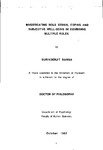INVESTIGATING ROLE STRAIN, COPING AND SUBJECTIVE WELL-BEING IN COMBINING MULTIPLE ROLES
| dc.contributor.author | BANGA, SURINDERJIT | |
| dc.contributor.other | School of Psychology | en_US |
| dc.date.accessioned | 2013-10-11T08:59:15Z | |
| dc.date.available | 2013-10-11T08:59:15Z | |
| dc.date.issued | 1997 | |
| dc.identifier | NOT AVAILABLE | en_US |
| dc.identifier.uri | http://hdl.handle.net/10026.1/2163 | |
| dc.description.abstract |
This thesis investigates some of the salient factors involved in women's experience of combining and coping with multiple roles. A total of four studies are undertaken using both quantitative and qualitative methods to progressively focus on those factors which are identified as particularly relevant. Consequently, data is gathered using diary, interview and questionnaire methods in order to cast light upon the precise nature of the relationship between combining multiple roles, reported life satisfaction, coping and personality. In addition to identifying which particular role combinations lead to the greatest conflict, the research also clarifies the optimum number of role demands associated with reports of high life satisfaction. In so doing, the thesis provides support for the Scarcity Hypothesis as well as supplying detail about the precise nature of the role combinations associated with high and low life satisfaction. The implications of these findings for advising women on role combinations are considered. The nature of the relationship between certain key role combinations and preferred coping strategies is explored. Results suggest a relationship between certain role strains and particular coping strategies. Emotion-focused coping is preferred for inter-role conflict whereas 'superwoman' coping is more prevalent for role overload. Finally, the relationship between two major personality factors, role strain and coping, is investigated. Individuals with high scores for neuroticism are identified as expressing greater inter-role conflict, and using fewer emotion-focused coping strategies, compared with those with low scores on this scale. The implications of these findings in relation to potential social and therapeutic interventions are discussed and it is proposed that counselling and counter-conditioning might be employed to help change both cognitions and behaviour. The thesis concludes with a reflexive look at findings, issues of contention, avenues for future research, and potential practical implications. | en_US |
| dc.language.iso | en | en_US |
| dc.publisher | University of Plymouth | en_US |
| dc.title | INVESTIGATING ROLE STRAIN, COPING AND SUBJECTIVE WELL-BEING IN COMBINING MULTIPLE ROLES | en_US |
| dc.type | Thesis | |
| dc.identifier.doi | http://dx.doi.org/10.24382/4566 | |
| dc.identifier.doi | http://dx.doi.org/10.24382/4566 |
Files in this item
This item appears in the following Collection(s)
-
01 Research Theses Main Collection
Research Theses Main


